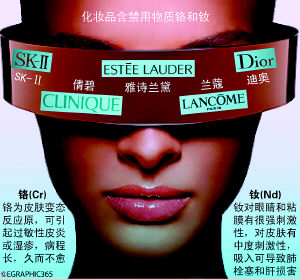Reuters is reporting China consumers turn cautious on P&G skin-care row.
SHANGHAI (Reuters) - Public anger in China over a popular skin-care line has become a public relations headache for Procter & Gamble, underlining the challenges foreign firms face as they contend with increasingly discriminating consumers.CBS News is reporting Irritating skin whiteners pulled from shelves in China
The U.S. company suspended sales of its SK-II cosmetics line in China last Friday after the country's quality watchdog said it found traces of potentially harmful chemicals in the products.
Windows have been smashed at the company's Shanghai office and one of its Web sites have been hacked at the weekend after the firm went back on an undertaking to give customers their money back pending further word from the watchdog, said a P&G spokesman, Charles Zhang.
"In Wuhan and Harbin, there were incidents where there was some physical contact between our beauty consultants and consumers," Zhang said, adding no one had been hurt.
In another incident reported by Chinese media last week, counters in Shanghai selling the Japan-made products were forced to close after police broke up an angry crowd demanding refunds.
Sales of an expensive line of skin whiteners, concealers and other skin care products have been stopped at cosmetic counters across China after inspectors found two ingredients that are banned under Chinese regulations.Lovely. We will give you a refund if you sign a form that says there was no reason to give you a refund. Who was the genius at P&G that dreamt up this solution? Hopefully he (or she) was fired.
Customers in China and South Korea have complained of rashes, and sales have been stopped in mainland China. However, Procter & Gamble's line of cosmetic creams, called SK-II, remains on sale in 14 countries, including Canada.
Chinese health regulators found trace amounts of the two heavy metals in the products, which are made in Japan. Chromium is used in stainless steel and to prevent corrosion; neodymium is used for colouring glass and whitening.
At first, a spokesman in Tokyo said the company was investigating how the metals could have gotten into the creams. A statement issued in Canada said the metal content was natural and harmless in small quantities.
But a chemical pathology expert was quoted in China as saying use of contaminated cosmetics could cause skin irritations and, very rarely, skin cancer.
Procter & Gamble initially said it would not stop selling the product, but it would give people refunds, if they signed forms saying there was nothing wrong with their creams.
A good friend sent me a couple of pictures with a comment about the title of the first article above. "Cautious?", she quipped, "Does this look like cautious to you?"
Smashed windows at P&G Shanghai office

Warning about various Cosmetics

My friend was also gracious to provide a formal translation of the above.
Here goes:
The first line on the forehead translated into:
Cosmetics contains banned chemicals: Cr and Nd
The English and Chinese on the eye cover were the names of the cosmetic products in English and Chinese.
The Chinese characters on the left corner translated:
Cr can cause skin rash, severe allergies, and make long even permanent damage to the skin.
The Chinese characters on the right corner translated:
Nd can cause bad reactions to the eye and mucosa. If inhaled, it can cause pulmonary embolism in the lungs and damage the liver.
My friend asked me to mention that China uses the EU standard for cosmetics, so these chemicals are banned.
Here are the reported health effects of neodymium.
Here are the reported health effects of chromium.
The question of the day is "How long will it be before Chinese companies come out with their own brands competing against Clinique, Estee Lauder, SK-II, Dior, etc?" Based on the "cautious reaction" displayed above, I have a feeling it might be faster than some might think.
Mike Shedlock / Mish
http://globaleconomicanalysis.blogspot.com/







